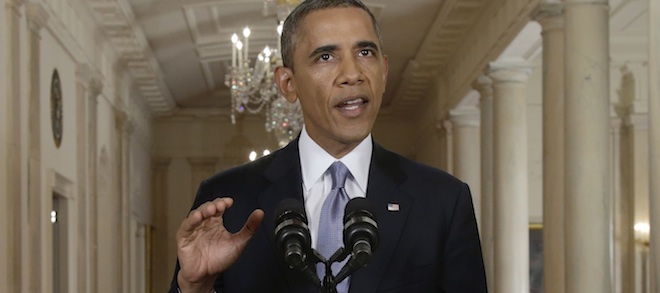About Obama’s Syria address
The commander in chief cast himself as reluctant warrior as he made his case for a military response
President Barack Obama addresses the nation in a live televised speech from the East Room of the White House in Washington, Tuesday, Sept. 10, 2013. President Obama blended the threat of military action with the hope of a diplomatic solution as he works to strip Syria of its chemical weapons. (AP Photo/Evan Vucci, Pool)
Share

Well, that was an odd speech.
U.S. President Barack Obama addressed the American people Tuesday night to make the case for a military response to the apparent large-scale use of chemical weapons by the regime of Syrian President Bashar al-Assad on August 21 — sort of.
The President reminded viewers of the chemical attack’s horrors in blunt and vivid detail. He also made a security-based pitch for a response — arguing that a failure to do so would erode the power of an international ban on chemical weapons and would encourage Iran to accelerate its own pursuit of a nuclear bomb without fear of reprisals.
Obama addressed some of the criticisms that have been made about his planned strike. He pledged not to put any American boots on the ground, and he said he would not pursue a prolonged air campaign such as the ones that took place in Libya or Kosovo (the latter lasted 78 days).
Confronting arguments that a restrained round of air strikes wouldn’t accomplish anything, Obama said the American military “doesn’t do pin pricks.” This was a good sound bite but must have been news to Secretary of State John Kerry, who only yesterday described potential American military action as “unbelievably small.” Obama himself has been stressing the “limited and proportional” nature of the strikes he is contemplating.
Obama tried to cast himself as a reluctant warrior. He said he has spent the last four years trying to end wars, not start them. Obama still seems unable to grasp that quitting or avoiding wars and ending them are not the same thing. But no matter. His point was to make it clear that he is not eager for conflict. Obama stressed the non-military options, such as sanctions and diplomacy, that he had already tried without succeeding in stopping Assad from using chemical weapons.
At this point it seemed as if the speech would naturally progress to a conclusion that force has become unavoidable.
Instead, Obama pivoted to the ongoing diplomatic gong show in which Russia proposes that Syria gives up its chemical weapons to prevent air strikes against it, but rejects a similar French initiative because it blames the Syrian government for the August 21 massacre and calls for those responsible to face trial.
Obama called all this “encouraging” and said he had asked congressional leaders to postpone a vote authorizing the use of force in Syria.
If this track is successful, and Assad’s chemical stockpiles are destroyed peacefully, some of the security threats Obama said they present to American interests will be mitigated. Such a solution will not end the war or the pain of the Syrian people, who continue to die by the hundreds every week.
However, the chances of America, Britain, France, Russia, and Syria all agreeing to a process by which Syria is stripped of chemical weapons but suffers no other consequences for using them is small. The Russian initiative has bought Assad some time. Several weeks from now, Obama will likely again address the American public to talk about Syria, this time to announce that cruise missiles are on their way to Damascus.